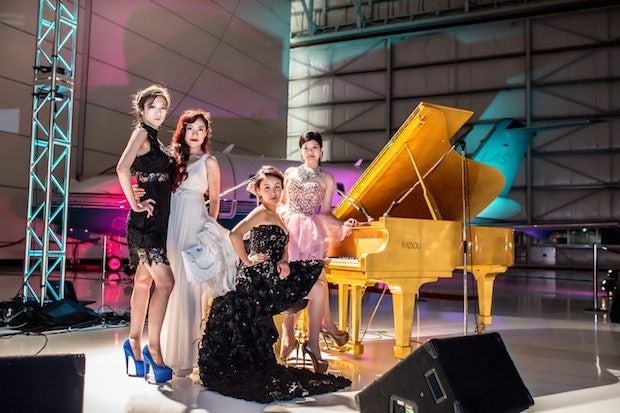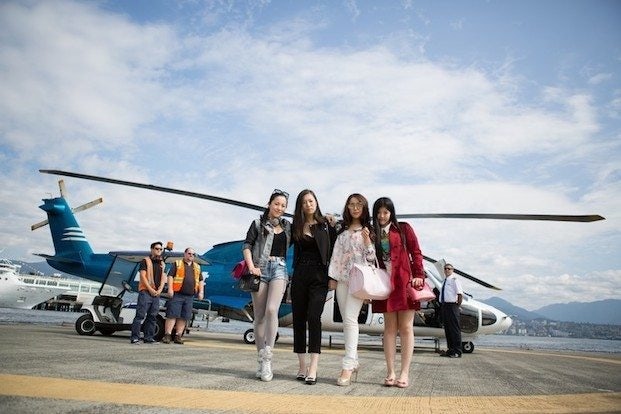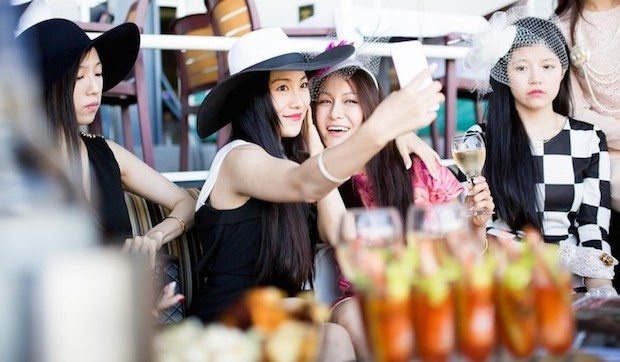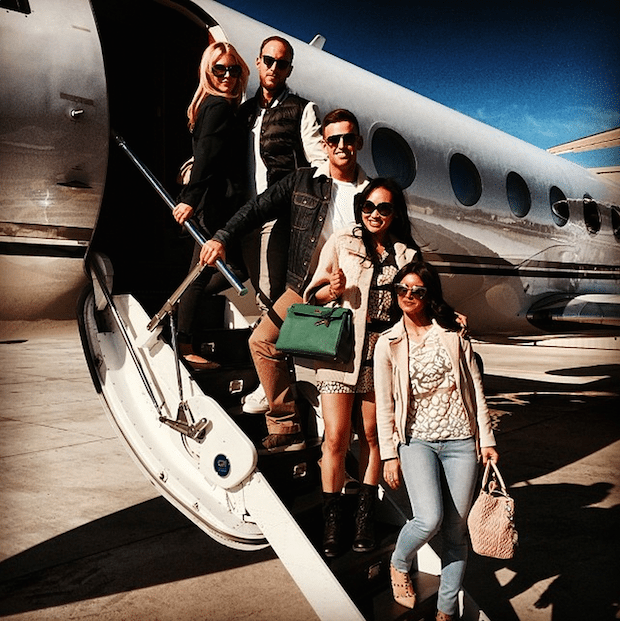
The cast of Ultra Rich Asian Girls. (Courtesy Photo)
From the Kardashians to Rich Kids of Beverly Hills, characters showing off their extravagant wealth is a tried-and-true reality show success formula that generates big ratings (and backlash). Now, one new Canadian web series adds a Chinese spin to the genre with its cast of four young women whose parents are among China’s growing ranks of millionaires.
Airing weekly on Youtube with its first episode currently online, Ultra Rich Asian Girls follows the indulgent lives of Florence, Chelsea, Coco, and Joy, a group of affluent Chinese 20-somethings living in Canada who aren’t shy about their love for Champagne and Chanel. While the show’s casting call was originally open to anyone of East Asian descent, the overwhelming presence of Chinese wealth in Canada led to an exclusively Chinese cast (Coco’s family hails from Taiwan, while those of the other three girls are from mainland China). Most of their parents made their money in real estate, according to show creator Kevin Li, and they represent a growing number of wealthy Chinese families heading abroad to cities across North America for business and educational opportunities.
Filmed mostly in Mandarin with both Chinese and English subtitles throughout the show, its creators are currently in talks with Chinese online video sites about syndicating it as an official series for a Chinese audience. The fascination with the lifestyles of wealthy immigrants to Canada has been especially popular in China: while the show’s promo posted about four months ago has generated about 383,000 hits on Youtube, it acquired 2.8 million hits on a Chinese video site. With a first episode that features the characters making catty remarks about the authenticity of each others' luxury handbags and speculating over who has had plastic surgery, the show is likely to generate as much controversy as its American counterparts such as Rich Kids.
In order to learn more about the concept behind the show, we interviewed Li about what to expect this season, his response to the backlash to reality shows about the super rich, and his plans for the future of the series.
The series premiere was on October 26—what should viewers expect from this season?#
This is our premiere season and this is actually my first reality TV show. Of course, Vancouver is now home to a lot of new immigrants and a lot of them are quite wealthy and affluent, so what we can expect is basically the girls are growing up—they’re between 19 and 27 years old—and many of them are just finishing school and starting their careers.
What we explore is that they are living their life and trying to figure out how to get their careers started with one step ahead of many people—being born with wealthy parents. We visit a lot of high-end events like a luxury supercar weekend; we went to a private island that the girl’s family owns; we even have our season finale in Europe on a bit of a shopping spree, including expensive pianos and wine tasting.

The cast was selected through a casting call process that attracted applicants from both North America and Asia. (Courtesy Photo)
What inspired you to create the show?#
I was born, bred, and raised in Vancouver, and over the three and a half decades that I’ve been here, I’ve noticed there was a huge change in the Chinese demographic here. First was sort of like the Chinese from the village, and then in the 90s, it was the Chinese from Hong Kong, and now it’s Chinese from the mainland.
With every generation that comes, they are are more and more affluent. With Hong Kong, which I thought was pretty rich, everyone bought BMWs and Mercedes, and now the mainland Chinese who are coming over are buying the Ferraris, the Lamborghinis, Bentleys, McLarens, Rolls-Royces—so it’s really beyond what I’ve known Chinese to be in Canada. Being a producer that’s worked in news broadcasting for 16 years, I thought this was a very interesting trend and I wanted to create a show that addresses this new demographic in town.
How did you select your characters?#
We put out a promo video back in June—it got a lot of media attention and we had a casting call. From that casting call, we had people from as far away as Singapore, Taiwan, and the United States applying to be on the cast, as well as a lot of people actually from Vancouver, and that’s where we chose our girls from.
Why did you decide to choose an all-female cast?#
I think that it’s because of the recent "Housewives of X” series, the Kardashians, the Rich Kids of Beverly Hills—they all have this similar theme, and I think they have pretty well-received females. We decided to start with the females, and we may be introducing males later on.

A still from the show. (Courtesy Photo)
There are already similar reality shows about wealth on air in the United States such as Rich Kids of Beverly Hills and Shahs of Sunset—how is the focus on a group of wealthy Chinese people different from these?#
The way I explain it is this: on the other American shows, a lot of the drama comes from direct stabs at one another, whereas the Chinese are different; they’re not trying to be black, they’re not trying to be white. They have their own way of drama, and I would describe it as “death by a million paper cuts” where they would start slicing you a little bit first; you don’t notice it—the third one, fourth one—next thing you know, you’re cut all over and it hurts.
The major difference between my show and other “rich” shows is that it’s going to be mix of reality and documentary. I come from a news background and I have a deep passion for Chinese and Chinese-Canadian history, and I want to use this topic of fuerdai [English: second-generation rich] to bring out the success story of how the mainland Chinese can not only catch up, but exceed in economic growth in only about 20–ish years and at the same time, remind the audience of the struggles many early Chinese-Canadian pioneers faced when they first came. This is my way of subtly hiding “vitamins in candy" (all without getting political!).
It’s a lot of cultural drama that happens that’s going to be different, and when I first created the show, it really did have more or less the Chinese audience in mind because I feel that there are a lot of people in China who don’t know what their immigrated counterparts are doing overseas. I think there’s a curiosity there, so on one hand, they’re finding out what their counterparts are doing, and on the other hand, we’re showcasing the city that they live in, which is also Vancouver, just to get a glimpse of what it’s like outside; it’s a bit of a curiosity.
Similar shows such as Shahs and Rich Kids have generated a lot of controversy over the characters’ extravagant displays of wealth. Are you expecting a similar response to this show?#
Absolutely. Anything to do with money these days is very controversial. However, North America is a capitalistic free continent. People are able to be poor, rich, or middle-income, and it’s their freedom to do this. To people with this controversy, everybody’s treated as an individual, and we shouldn’t judge people based on class, race, or sexual orientation. They should be open-minded. The more they spend the more our economy keeps moving.
One of my favorite shows growing up was Lifestyles of the Rich and Famous with Robin Leach—“Champagne wishes and caviar dreams.” With a show like this, it’s basically a modern version of that where people do get a glimpse of what it may be to have a lot of this wealth and freedom with money.

Shows like Rich Kids of Beverly Hills (shown above) served as inspiration for the reality series. (Instagram/dorothywang)
What has the media reaction been like in China?#
When I created this show, I didn’t expect this kid of media response, but it has been huge. It hit all over Asia—if I’m looking at my analytics on Youtube, it was Malaysia, Singapore, Taiwan… of course China doesn’t get it so it’s routed through Hong Kong or something like that. Even newspapers in Hong Kong: Apple Daily wrote about us, Wall Street Journal Asia, South China Morning Post—it’s really had a world interest far beyond what I was expecting.
Of course, the reactions are both positive and negative—anything to do with money and race—and I expected that.
Do you think the characters’ behavior on the show will affect stereotypes of wealthy Chinese people?#
With the four girls, they’re actually all quite unique, and I think there is a misconception of mainland Chinese; I think there is a misconception of people with money. I myself was born, bred, and raised in East Vancouver, which is a working class area—like all east sides of any town. I certainly don't live that lifestyle myself, however, I found that they’re very similar to me and our whole team and crew gets along great.
I think the stereotype is based on a lot of misconception. With the four girls, like Florence and Chelsea—Florence got her first job when she was 15 years old working as a gardener as job placement, and she also worked as a waitress. She has a master’s degree in fashion design from Istituto Maragoni in Milan, and Chelsea just graduated from University of British Columbia with honors in math. I think a lot of the stereotypes of what a wealthy fuerdai Chinese are contradicted by the girls that I have found, and I think these are great representations of what a responsible Chinese should be like.
The show is currently available as a Youtube series but has received a lot of media attention so far—are there any talks in the works about moving to a major TV network?#
We’ve actually been approached by a couple of Chinese web hosting sites or Chinese versions of Youtube. They are interested in an exclusive for the show, so we are in negotiations for that, and then we have been approached by a couple of co-production companies that do want to expand this into a North American market.
The only hesitation I have right now is that they want the girls to speak in English to fit the North American market, but my feeling is that the show and the promos have been in Chinese with subtitles and no person has complained about that. It’s actually reaching the market just fine. My business partner and I are looking at options.